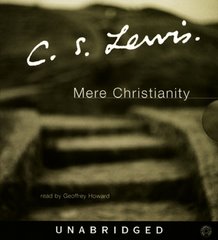We're back! Now meeting at the UWBC commons area in Meggers Hall at noon on Mondays, we will soon wade deeply into Mere Christianity. After meeting informally on Monday, April 2, we will jump into the preface, "The Law of Human Nature" and ""Some Objections" on April 9. In discussion questions I will plan to identify the section I was reading by book number (four books) and chapter number (1.1, 1.2, 2.1, 2.2...) rather by page since we do not all have the same edition of the book.
Here is a discussion agenda to get you started:
- (preface) Why does Lewis call his series "mere" Christianity?
- (preface) Do you think Lewis assigns any value to the doctrinal areas where Christians disagree?
- (1.1) How do people reveal that they believe in moral absolutes even when they say they do not? How does this demonstrate the claim of Romans 2:14-16?
- (1.1) Is it necessary to know what is right in order to claim something is wrong?
- (1.2) What is more powerful than both the "herd instinct" and the "instinct for self-preservation"?
- (1.2) Why is following a love for humanity "at all costs" a dangerous guide that can make us into "devils"?
- How do you see this discussion fitting both Nazi-era England and our own nation in 2007?


2 comments:
1. He calls it Mere Christianity because the goal of the book is to present the "agreed, or common, or central, or 'mere' Christianity." Setting aside the disputed doctrines and man-made systems that are unnecessary for salvation, what are the bare-bones basics of being a christian? My one question is what does H.C.F. stand for? It's probably obvious, but I missed it. :0)
2. I think he places a high value on disputed doctrines, but for the sake of the book is not presenting them here.
3. Every person has a conscience because the work of the law is written on his heart. This conscience may or may not be trained biblically, but it is very much active in every single person.
4. Yes...although in math my response would be, "I don't know what the right answer is, but I know it isn't ___." Hmmm... I think I'm going to change my answer. You can know something is wrong without knowing what is right.
I'm running out of time. I wish everyone a blessed Easter reflecting on the death and resurrection of our great God and Saviour. Stay warm!
4. To say something is wrong without agreeing to some sort of absolute right...how then can you say that something is wrong? I think in this part of the book, Lewis is trying to convey that there IS a "right" installed in all humanity, whether we choose to follow it or not is generally the problem.
5. More powerful than the herd instinct and the need to fulfill self is the perfect grace of God...and the will of God to glorify Himself.
6. We then forget that our purpose is not to serve others, but God.
Post a Comment